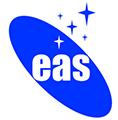German Astronomical Society welcomes new president and board members
“As president of the AG, I will make every effort to use the common voice of the AG in a variety of ways in the most diverse areas in order to continue the successful work of my predecessors,” said Michael Kramer, director at the Max Planck Institute for Radio Astronomy (MPIfR) in Bonn. Michael Kramer has stepped into his new role as president of the AG after AG’s general assembly on September 22, during the AG 2020 virtual annual meeting. He studied physics at the University of Cologne and received his doctorate from the MPIfR and the University of Bonn. Afterwards he conducted research at the University of California at Berkeley, which was followed by research at the Jodrell Bank Observatory in Manchester. He was appointed Professor for Astrophysics at the University of Manchester and Associate Director at the Jodrell Bank Centre for Astrophysics. Since 2009 he has been director at the MPIfR - and also a member of the AG. His research interests are at the intersection of fundamental physics and astronomy, searching for and exploiting radio pulsars to test theories of gravity. Michael Kramer succeeds Joachim Wambsganß who was appointed president in 2017. The president of the AG usually also acts as the chair of the Council of German Observatories (Rat deutscher Sternwarten, or RDS for short), which is an organ of the AG. The RDS confirmed Michael Kramer as its new chairman during its meeting on September 30.
Upon proposal of a search commission, the members of the German Astronomical Society elected Stefanie Walch-Gassner as vice president of the AG. Stefanie Walch-Gassner studied physics at the University of Regensburg. After her doctorate at the Ludwig-Maximilians University in Munich, Germany, she did postdoctoral research at Cardiff University, Wales, UK, and at the Max Planck Institute for Astrophysics in Garching, Germany. In 2013, she was appointed Professor for theoretical Astrophysics at the University of Cologne, Germany. The focus of her research is on 3D simulations of gas dynamics and especially star formation. "As the voice of the AG I would like to promote the astronomical diversity in Germany and its positioning in the ever-growing consortia. This goes hand in hand with the promotion of young scientists,” states Stefanie Walch-Gassner.
Jörn Wilms succeeds Sonja Schuh from the Max Planck Institute for Solar System Research in Göttingen, who had performed outstanding services as counsellor for the AG in the last six years. Jörn Wilms is Professor of Astronomy and Astrophysics at the Dr. Karl Remeis-Sternwarte, the astronomical institute of the University of Erlangen-Nuremberg. His main research emphasis is the study of the physical processes responsible for the observed radiation from accreting stellar-mass and supermassive black holes and neutron stars.
Prof. Thomas W. Kraupe from the Planetarium Hamburg (treasurer), Dr. Klaus Reinsch from the University of Göttingen (secretary), Dr. Janine Fohlmeister from the Leibniz Institute for Astrophysics Potsdam (press officer) and Prof. Dr. Oliver Schwarz from the University of Siegen (counsellor) complete the board of the Astronomische Gesellschaft.
The German Astronomical Society (Astronomische Gesellschaft, or AG for short), founded in 1863, is the German national professional association for astronomy and astrophysics. The AG promotes activities in science and research, strengthens exchange between its members and supports the dissemination of science to the public and in education. On the international level, the AG represents the German astronomical scientific community in the European Astronomical Society (EAS) and the International Astronomical Union (IAU). The Council of German Observatories (Rat deutscher Sternwarten, or RDS for short) is a central body of the German Astronomical Society (AG), acting as the science policy committee of the AG, and representing the common interests of all German astronomical institutions vis-à-vis funding agencies, governments, international organisations and other relevant boards and committees.




